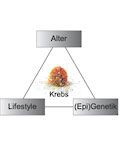Cancer Risk: Aspirin and Smoking Affect Aging of Genes

Our lifestyle choices affect the aging processes of our genome which can cause cell transformation and cancer (Fig.: Martin Oeggerli / Micronaut, in cooperation with FHNW.)
Already in the 1990s, scientists discovered that regular use of aspirin over long periods of time decreases the cancer risk. Since then, numerous studies have confirmed the protective effect of the drug against different types of cancer. Regular aspirin use is said to reduce the risk to develop colorectal cancer by an average of 40%. However, it is unknown how exactly the drug influences the cancer risk.
A research group led by Prof. Primo Schär, molecular geneticists at the Department of Biomedicine from the University of Basel and gastrointestinal specialist PD Dr. Kaspar Truninger, has now discovered a possible mechanism of how aspirin decreases the risk of cancer: It slows down certain aging processes of the genome – namely modifications that also play an important role in the development of tumors.
In order to analyze the relationships between lifestyle and genome aging, the researchers examined intestinal tissue samples of 546 healthy women over 50 years of age. They compared age-specific changes of gene markers, so-called DNA methylations, with the women's lifestyle factors regarding aspirin use, smoking, body mass index and hormonal replacement therapy. The most significant effects were measured for aspirin use and smoking.
Aging Markers
“Each cell's genome resembles a library that is full of bookmarks”, explains Schär. Thanks to these bookmarks, the cells know which genes to read, so that they can fulfill their specialized tasks as skin, muscle or intestinal cells. “But these markers are not very stable and change during the course of age. If, at certain parts of the genome, the change is to drastic, tumors can develop”, says Schär.
In this study, the researchers were able to show for the first time that this age-related decay of gene markers can be slowed down by the regular use of aspirin. Smoking on the other hand, accelerates the aging process. “Especially affected are genes that also play a role in the development of cancer”, says Dr. Faiza Noreen, research associate at the Department of Biomedicine from the University of Basel and first author of the study.
Truninger emphasizes that it would be premature to start taking aspirin solely for cancer prevention without consulting a doctor first – especially when regarding the potential side effects such as gastrointestinal bleeding.
Original source:
Noreen F, Röösli M, Gaj P, Pietrzak J, Weis S, Urfer P, Regula J, Schär P and Truninger K.
Modulation of Age- and Cancer Associated DNA Methylation Change in the Healthy Colon by Aspirin and Lifestyle.
http://jnci.oxfordjournals.org/content/106/7/dju161.abstract?keytype=ref&ijk…
Journal of the National Cancer Institute published online, 2014 106 (4): dju161
doi: 10.1093/jnci/dju161
Further information:
Prof. Primo Schär, Department of Biomedicine, University of Basel, phone: +41 (0)61 267 07 67, email: primo.schaer@unibas.ch
Media Contact
More Information:
http://www.unibas.chAll latest news from the category: Health and Medicine
This subject area encompasses research and studies in the field of human medicine.
Among the wide-ranging list of topics covered here are anesthesiology, anatomy, surgery, human genetics, hygiene and environmental medicine, internal medicine, neurology, pharmacology, physiology, urology and dental medicine.
Newest articles

Bringing bio-inspired robots to life
Nebraska researcher Eric Markvicka gets NSF CAREER Award to pursue manufacture of novel materials for soft robotics and stretchable electronics. Engineers are increasingly eager to develop robots that mimic the…

Bella moths use poison to attract mates
Scientists are closer to finding out how. Pyrrolizidine alkaloids are as bitter and toxic as they are hard to pronounce. They’re produced by several different types of plants and are…

AI tool creates ‘synthetic’ images of cells
…for enhanced microscopy analysis. Observing individual cells through microscopes can reveal a range of important cell biological phenomena that frequently play a role in human diseases, but the process of…





















